Boy George, the iconic singer of the 1980s band Culture Club, finds himself entangled in a complex web of financial and legal woes that threaten to strip him of his stage name and the band’s legacy. At the heart of the crisis lies the insolvency of Mispocha Touring, the company responsible for managing Culture Club’s concert revenue. Co-owned by George, bassist Mikey Craig, and guitarist Roy Hay, Mispocha Touring has amassed substantial debts, including a significant sum owed to media finance specialist MEP Capital. The failure to repay this debt places the ownership of the Culture Club name, Boy George’s stage name, and the band’s extensive back catalog, featuring hits like “Karma Chameleon” and “It’s a Miracle,” in jeopardy.
Adding to the precarious financial situation, Culture Club faces a separate, even larger debt to the US concert promoter Live Nation. This substantial financial burden requires a stringent repayment plan overseen by administrators, demanding regular payments of £500,000 every six months until December 2027. The combined weight of these financial obligations has forced George, born George O’Dowd, to take drastic measures, including renting out his luxurious Hampstead home in North London, in a desperate attempt to generate the necessary funds to address his mounting debts.
The legal battle surrounding Mispocha Touring’s insolvency has further complicated matters, as the expiration of trademarks for both “Boy George” and “Culture Club” has created a legal vacuum. The trademark for Boy George, which George O’Dowd had secured in 2014, lapsed in December 2023, along with the trademark for Culture Club. This lapse leaves the door open for others to potentially claim ownership of these valuable intellectual properties, further exacerbating the singer’s predicament. The potential loss of these trademarks adds another layer of complexity to an already challenging financial and legal landscape.
The singer’s financial struggles are not entirely new, as he faced a significant lawsuit a few years ago from former bandmate and ex-boyfriend Jon Moss. Moss, who played drums for Culture Club during their peak, filed a £1.75 million damages claim against George after being dismissed from the band in 2018. This legal battle, which Moss reportedly spent £1 million pursuing, was eventually settled out of court, adding another layer of financial strain to George’s already challenging circumstances. The details of the settlement remain undisclosed, but the legal costs incurred likely contributed to George’s current financial woes.
George’s participation in the reality show “I’m a Celebrity” in 2022 appears to have been motivated by the need to address his escalating financial challenges. The appearance fee for the show likely provided a much-needed influx of cash, although it ultimately proved insufficient to resolve the underlying financial issues. The appearance, however, highlights the extent of George’s financial difficulties and the lengths to which he is willing to go to rectify his situation.
The intricate web of financial and legal entanglements facing Boy George paints a picture of a once-celebrated artist now grappling with the consequences of financial mismanagement and legal disputes. The loss of his stage name, the potential loss of the Culture Club brand, and the mounting debts represent significant challenges for the singer. The situation serves as a cautionary tale about the importance of sound financial planning and legal protection, even for artists at the peak of their careers. The immediate future remains uncertain, with the outcome of the ongoing legal battles and the success of George’s attempts to generate income holding the key to resolving his financial predicament and securing his artistic legacy.


